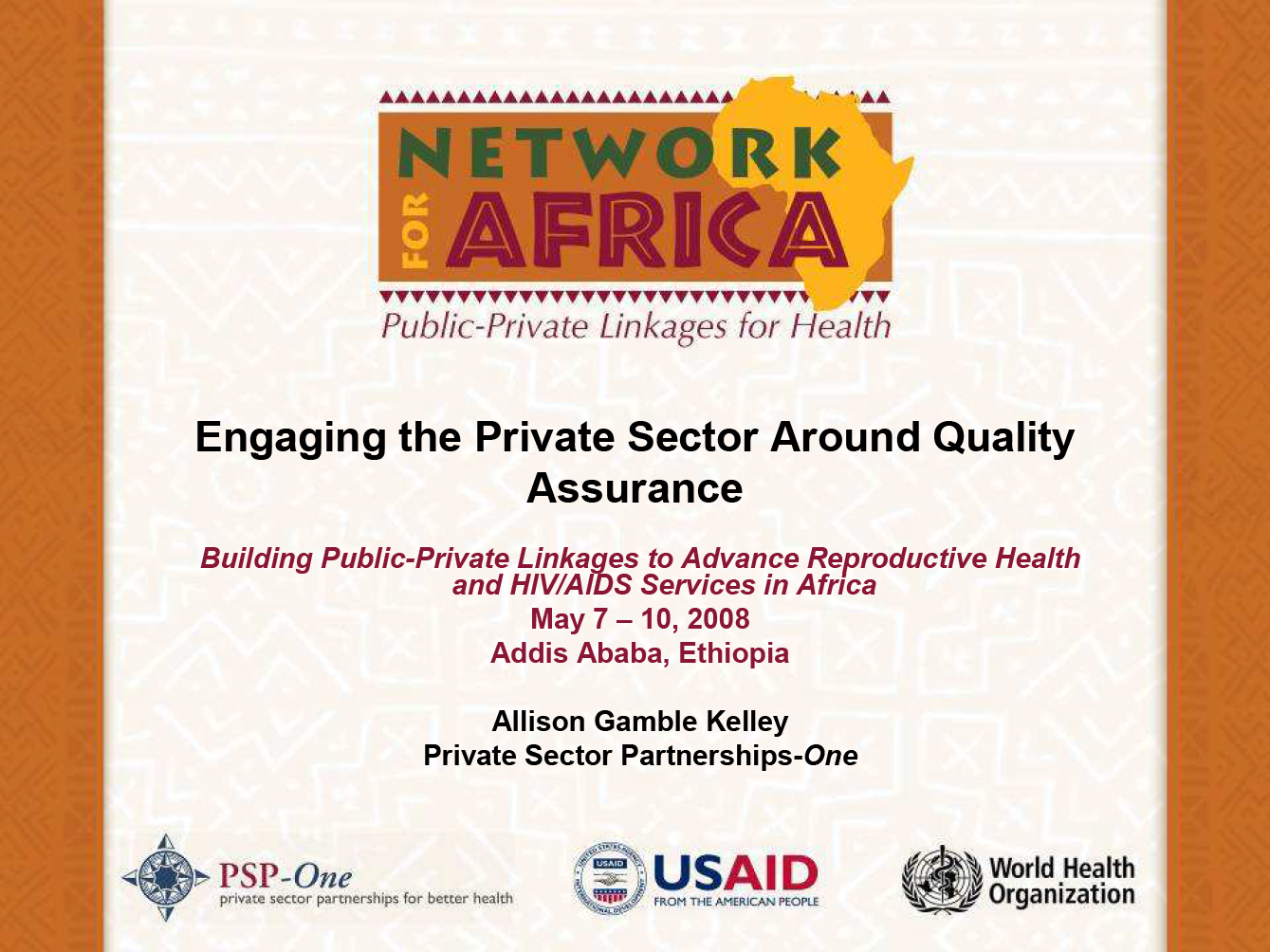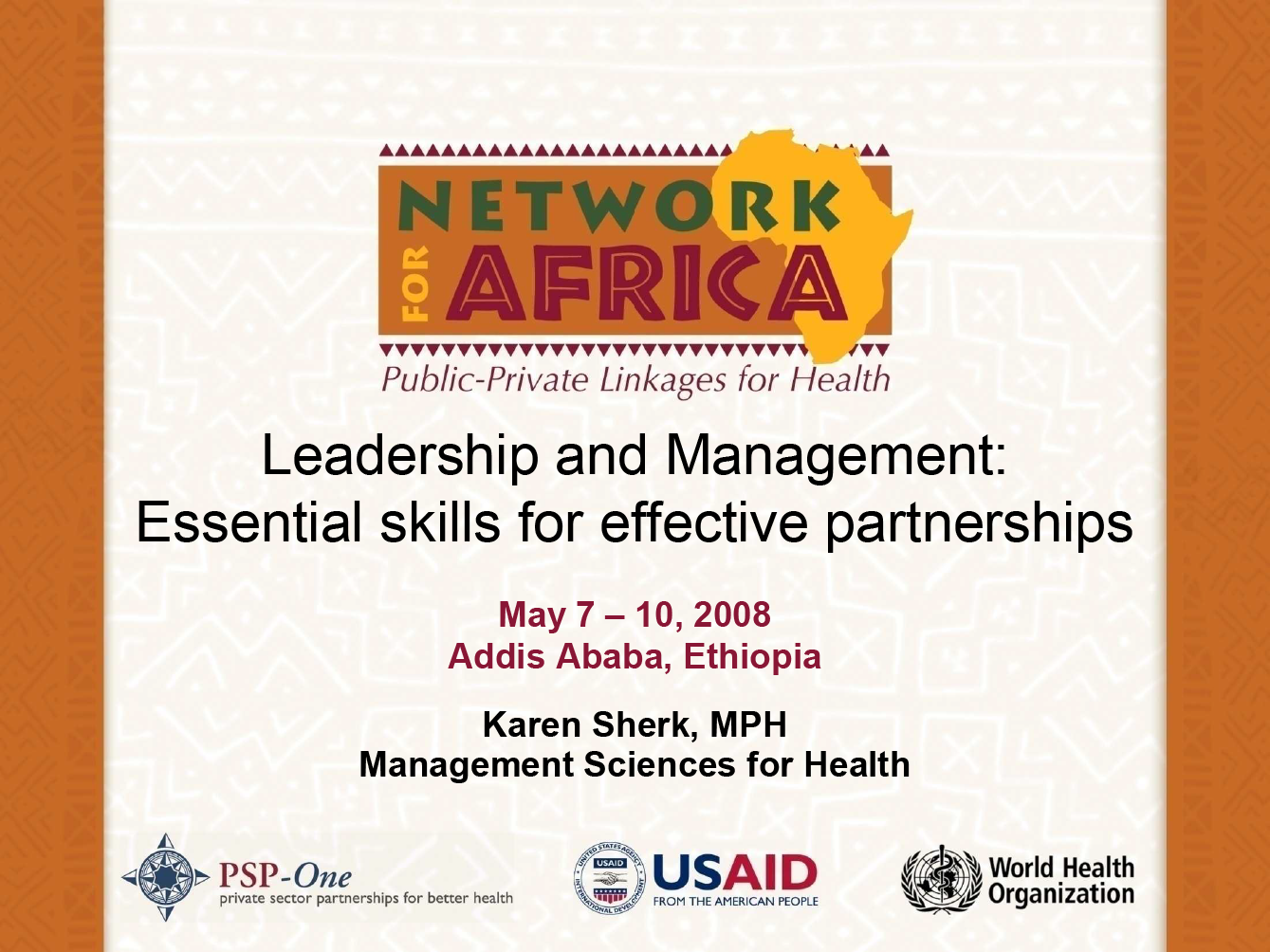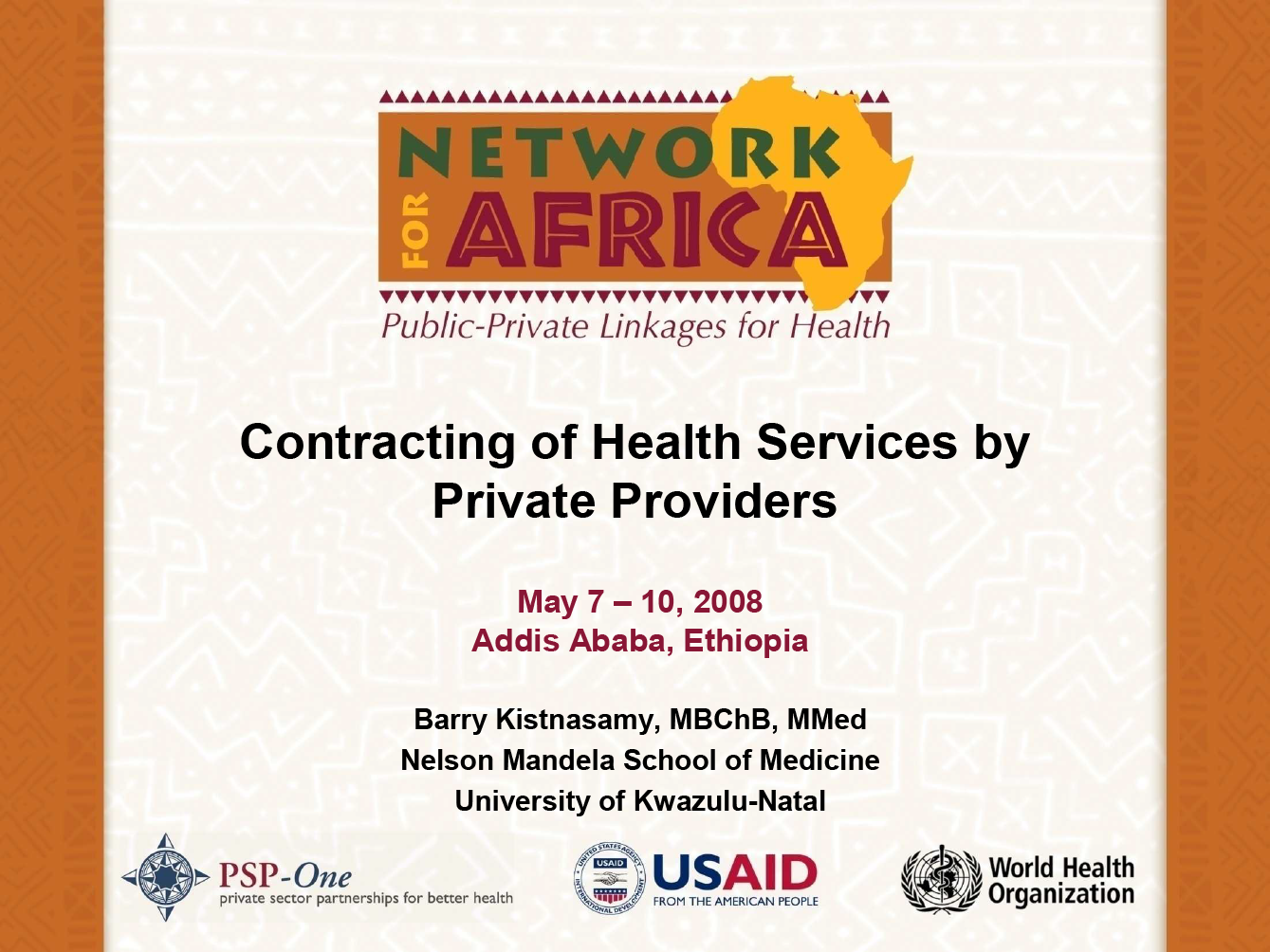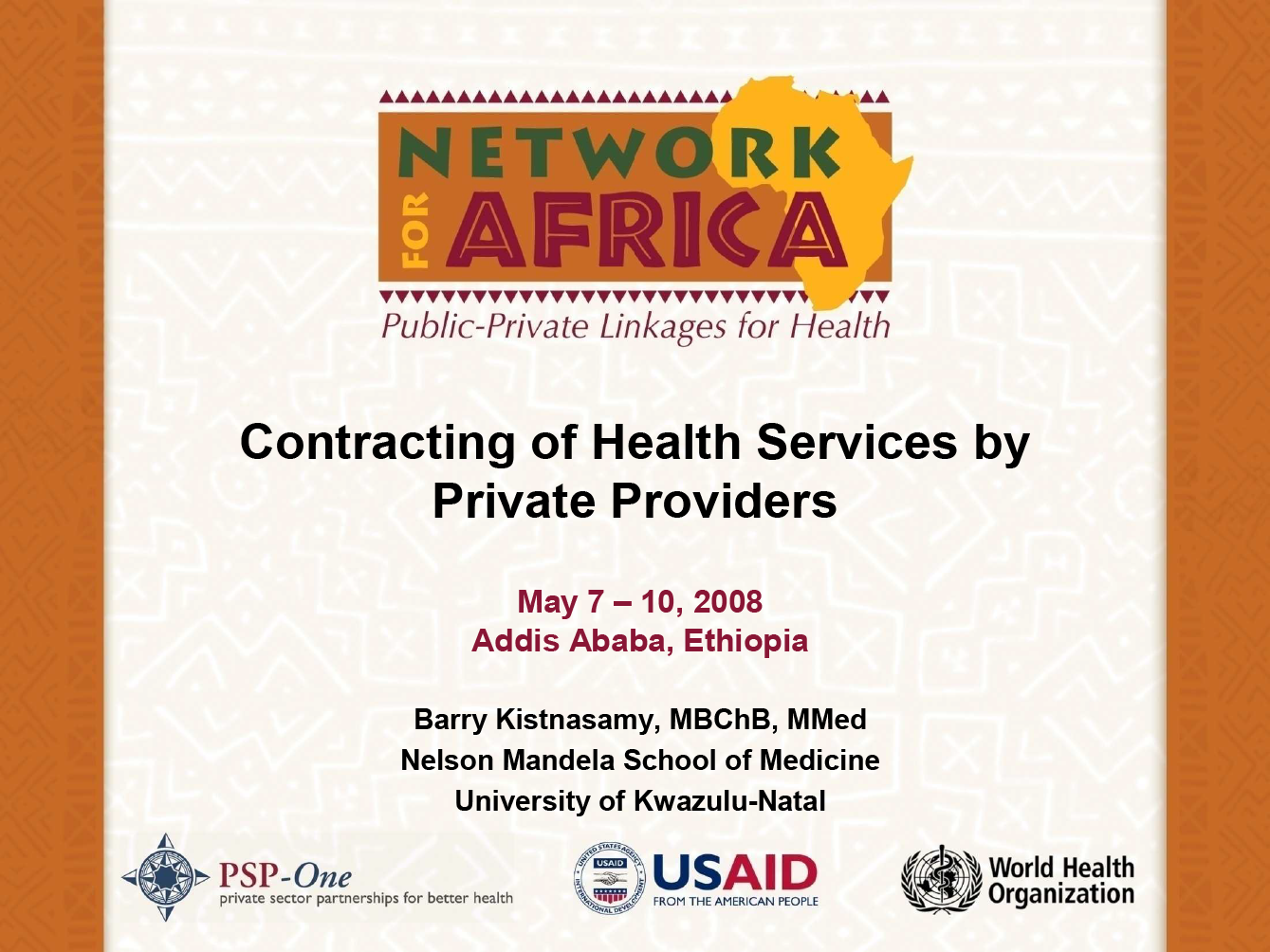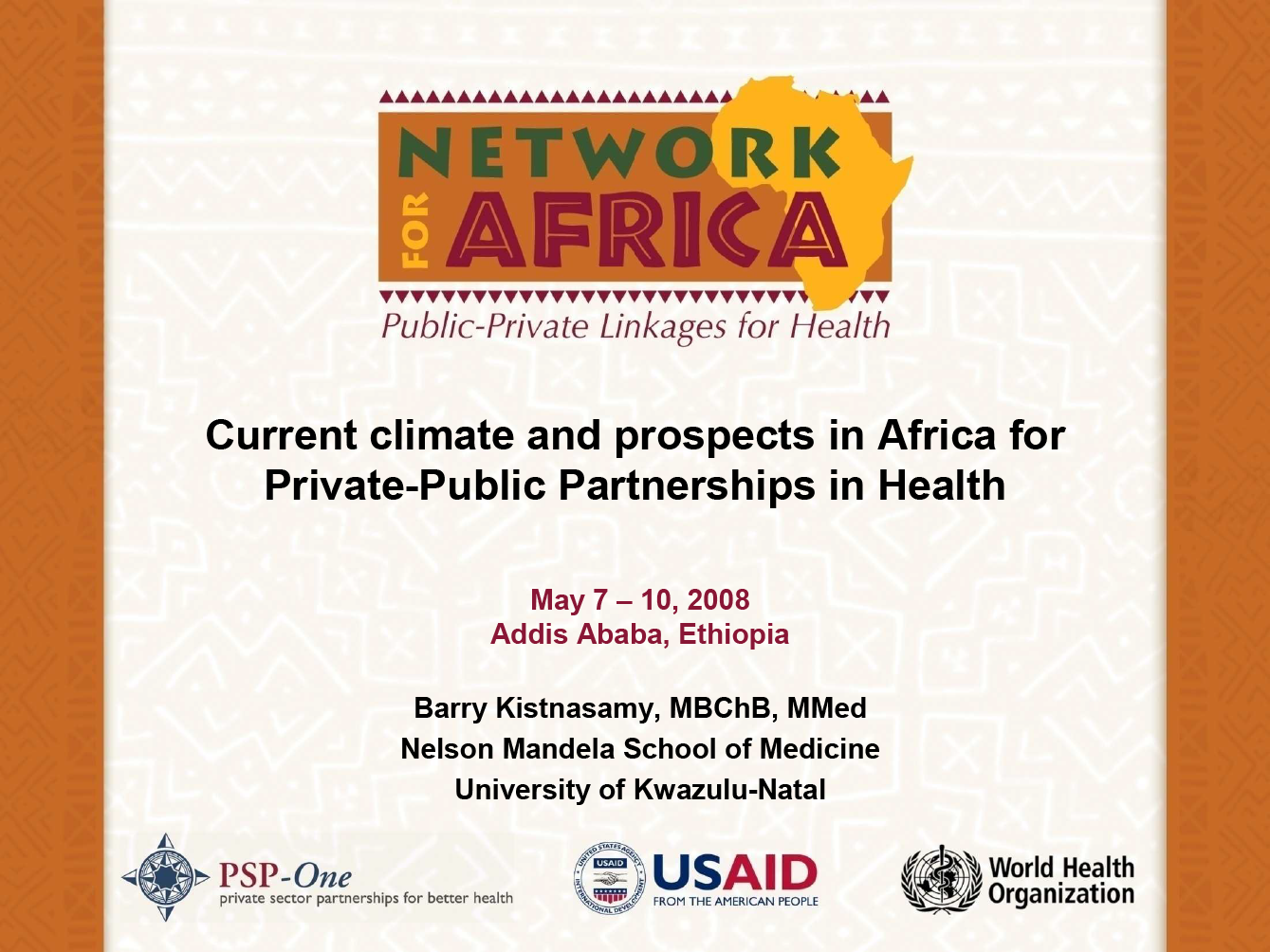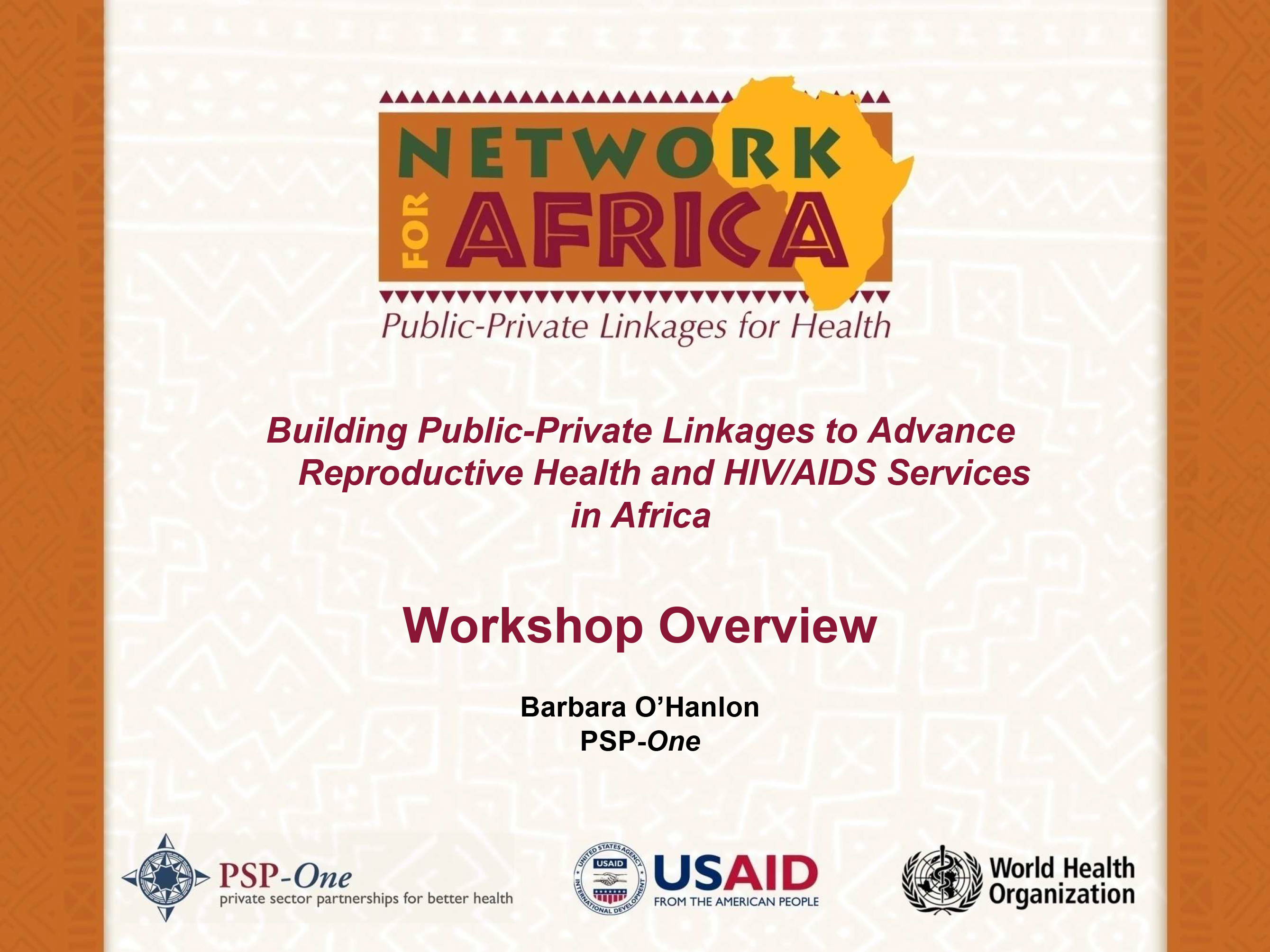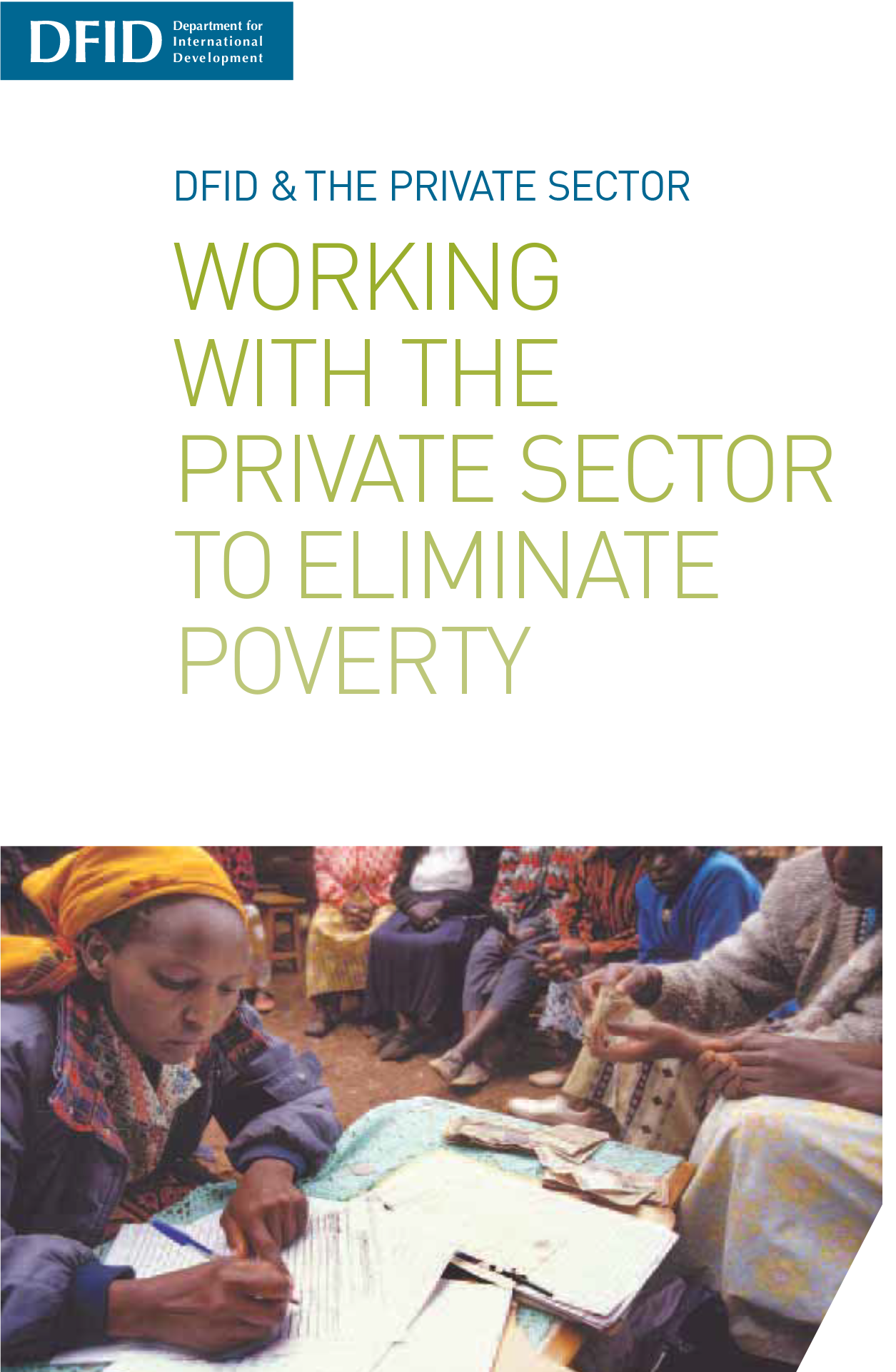
Resource Library
Report of the Regional Workshop on Building Public-Private Linkages to Advance Priority Health Services in Africa
1.1 ANTECEDENTS TO NETWORK FOR AFRICA AND ADDIS ABABA REGIONAL WORKSHOP The Private Sector Partnerships-One (PSP-One) project and the World Health Organization's Department of Reproductive Health and Research (WHO/RHR) continue to work together in support of increasing access to reproductive health and family planning (RH/FP) through the private health sector in Africa. In December 2006, PSP-One and WHO/RHR co-sponsored a consultation meeting on Public Policy and Reproductive Health Franchising and produced a joint guidance note on the evidence and future direction of private provider networks and franchising of RH/FP services (http://www.who.int/reproductive-health/healthsystems/meeting06.htm). Building on the success of this first policy meeting, the organizations designed a regional workshop focusing on Africa. With funding from the United States Agency for International Development's (USAID's) Repositioning Initiative,1 the PSP-One project is leading a two-year initiative — Network for Africa — that will build public-private linkages to advance universal access to RH in the region. WHO/RHR and PSP-One co-sponsored a regional workshop, held May 7-10, 2008, in Addis Ababa, Ethiopia, as one of the Network's first activities. 1.2 OVERVIEW OF ADDIS ABABA REGIONAL WORKSHOP The purpose of the workshop was to develop national capacity to design and manage partnerships with private sector stakeholders and provide an overview of the selected policy instruments commonly available to Ministries of Health (MOHs) and the public-private partnership (PPP) units. The workshop curriculum was based upon a World Bank Institute course on public policy for the private sector, which was revised for the African context and substantially updated with new information to reflect current trends in private sector provision of health services. Workshop objectives included:
- Developing existing public sector capacity to engage the private sector in the provision of RH/FP and HIV/AIDS-related services in selected Anglophone African countries
- Creating a network for experiential learning across countries on challenges in strengthening PPPs for RH/FP and HIV/AIDS
- Strengthening existing relationships and linkages across priority programs within African MOHs to work effectively with the private sector in support of national health goals (in general) and RH/FP (in particular)
- Identifying key actions and important next steps for participant countries to design, develop, and manage PPPs following the workshop
Participating countries: Teams of MOH officials from Ethiopia, Ghana, Kenya, Nigeria, United Republic of Tanzania, and Uganda attended the Addis workshop. The teams comprised: (i) the RH/FP director, (ii) the HIV/AIDS director, and (iii) the PPP unit director and/or PPP adviser. In addition, several USAID Health, Population and Nutrition (HPN) officers and President's Emergency Plan for AIDS Relief (PEPFAR) PPP advisers from these countries attended. (See Annex A for a directory of the participants.) Overview of workshop agenda: The workshop was designed around three thematic areas (See Annex B for a more in-depth discussion of the workshop agenda and methodology.):
- Making the case for why it is important to work with the private health sector as a means to help address health challenges in RH/FP and HIV/AIDS2.
- Offering a concise overview of the policy instruments the public sector can utilize to engage and encourage the private health sector to deliver RH/FP and HIV/AIDS services
- Designing a partnering process while, at the same time, stressing the management and leadership skills required to implement and sustain a PPP
Resource Type : Report
Country : Ethiopia, Ghana, Kenya, Nigeria, Tanzania, Uganda
Year : 2008-12-01T22:15:00
Language : English
Project : SHOPS

Resource Library
Engaging the Private Sector Around Quality Assurance
The Abt Associates-led PSP-One project co-sponsored a workshop with the World Health Organization's Department of Reproductive Health and Research (WHO/RHR) in Addis Ababa, Ethiopia May 7 – 10, 2008. Entitled "Network for Africa: Building Public-Private Linkages to Advance Priority Health Services," the four-day workshop aimed to develop national capacity to design and manage partnerships with private sector stakeholders to address reproductive health/family planning and HIV/AIDS-related health challenges. Participating countries included Ethiopia, Ghana, Kenya, Nigeria, Tanzania, and Uganda. The workshop curriculum was based on a World Bank Institute course on public policy for the private sector, which was revised for the Africa context and updated to reflect current trends in private sector provision of health. The following is a presentation on quality assurance in the private sector by Allison Gamble Kelley, of PSP-One.
Resource Type : Presentation
Country : Ethiopia, Ghana, Kenya, Namibia, Tanzania, Uganda
Year : 2008-08-14T11:30:00
Language : English
Project : SHOPS

Resource Library
Leadership and Management : Essential Skills for Effective Partnerships
The Abt Associates-led PSP-One project co-sponsored a workshop with the World Health Organization's Department of Reproductive Health and Research (WHO/RHR) in Addis Ababa, Ethiopia May 7 – 10, 2008. Entitled "Network for Africa: Building Public-Private Linkages to Advance Priority Health Services," the four-day workshop aimed to develop national capacity to design and manage partnerships with private sector stakeholders to address reproductive health/family planning and HIV/AIDS-related health challenges. Participating countries included Ethiopia, Ghana, Kenya, Nigeria, Tanzania, and Uganda. The workshop curriculum was based on a World Bank Institute course on public policy for the private sector, which was revised for the Africa context and updated to reflect current trends in private sector provision of health. The following is a presentation on effective public private partnerships, by Karen Sherk, MPH Management Sciences for Health
Resource Type : Presentation
Country : Ethiopia, Ghana, Kenya, Namibia, Tanzania, Uganda
Year : 2008-08-14T11:15:00
Language : English
Project : SHOPS

Resource Library
Contracting of Health Services by Private Providers
The Abt Associates-led PSP-One project co-sponsored a workshop with the World Health Organization's Department of Reproductive Health and Research (WHO/RHR) in Addis Ababa, Ethiopia May 7 – 10, 2008. Entitled "Network for Africa: Building Public-Private Linkages to Advance Priority Health Services," the four-day workshop aimed to develop national capacity to design and manage partnerships with private sector stakeholders to address reproductive health/family planning and HIV/AIDS-related health challenges. Participating countries included Ethiopia, Ghana, Kenya, Nigeria, Tanzania, and Uganda. The workshop curriculum was based on a World Bank Institute course on public policy for the private sector, which was revised for the Africa context and updated to reflect current trends in private sector provision of health. The following is a presentation on Contracting Health Services by Private Providers, by Barry Kistnasamy, MBChB, MMed Nelson Mandela School of Medicine University of Kwazulu-Natal.
Resource Type : Presentation
Country : Ethiopia, Ghana, Kenya, Namibia, Tanzania, Uganda
Year : 2008-08-14T11:00:00
Language : English
Project : SHOPS

Resource Library
Financing Mechanisms to Mobilize the Private Health Sector
The Abt Associates-led PSP-One project co-sponsored a workshop with the World Health Organization's Department of Reproductive Health and Research (WHO/RHR) in Addis Ababa, Ethiopia May 7 – 10, 2008. Entitled "Network for Africa: Building Public-Private Linkages to Advance Priority Health Services," the four-day workshop aimed to develop national capacity to design and manage partnerships with private sector stakeholders to address reproductive health/family planning and HIV/AIDS-related health challenges. Participating countries included Ethiopia, Ghana, Kenya, Nigeria, Tanzania, and Uganda. The workshop curriculum was based on a World Bank Institute course on public policy for the private sector, which was revised for the Africa context and updated to reflect current trends in private sector provision of health. The following is a presentation on financing mechanisms by Allison Gamble Kelley, of O'Hanlon Consulting.
Resource Type : Presentation
Country : Ethiopia, Ghana, Kenya, Namibia, Tanzania, Uganda
Year : 2008-08-14T10:15:00
Language : English
Project : SHOPS

Resource Library
Current Climate Prospects in Africa for Public-Private Partnerships in Health
The Abt Associates-led PSP-One project co-sponsored a workshop with the World Health Organization's Department of Reproductive Health and Research (WHO/RHR) in Addis Ababa, Ethiopia May 7 – 10, 2008. Entitled "Network for Africa: Building Public-Private Linkages to Advance Priority Health Services," the four-day workshop aimed to develop national capacity to design and manage partnerships with private sector stakeholders to address reproductive health/family planning and HIV/AIDS-related health challenges. Participating countries included Ethiopia, Ghana, Kenya, Nigeria, Tanzania, and Uganda. The workshop curriculum was based on a World Bank Institute course on public policy for the private sector, which was revised for the Africa context and updated to reflect current trends in private sector provision of health. The following is a presentation on the current climate for Public Private Partnerships in Health in Africa by Barry Kistnasamy, MBChB, MMed Nelson Mandela School of Medicine University of Kwazulu-Natal .
Resource Type : Presentation
Country : Ethiopia, Ghana, Kenya, Namibia, Tanzania, Uganda
Year : 2008-08-13T15:30:00
Language : English
Project : SHOPS

Resource Library
Building Public-Private Linkages to Advance Reproductive Health and HIV/AIDS Services in Africa
The Abt Associates-led PSP-One project co-sponsored a workshop with the World Health Organization's Department of Reproductive Health and Research (WHO/RHR) in Addis Ababa, Ethiopia May 7 – 10, 2008. Entitled "Network for Africa: Building Public-Private Linkages to Advance Priority Health Services," the four-day workshop aimed to develop national capacity to design and manage partnerships with private sector stakeholders to address reproductive health/family planning and HIV/AIDS-related health challenges. Participating countries included Ethiopia, Ghana, Kenya, Nigeria, Tanzania, and Uganda. The workshop curriculum was based on a World Bank Institute course on public policy for the private sector, which was revised for the Africa context and updated to reflect current trends in private sector provision of health. The following is a workshop overview, presented by Barbara O'Hanlon.
Resource Type : Presentation
Country :
Year : 2008-08-13T15:15:00
Language : English
Project : SHOPS

Resource Library
Use and misuse of a discount voucher scheme as a subsidy for insecticide-treated nets for malaria control in southern Tanzania
Since 1997, discount vouchers for insecticide-treated nets (ITNs) have been used in two rural districts of southern Tanzania as a way to target subsidies to children under 5 years and pregnant women. We assessed appropriate use and misuse of discount vouchers through a follow-up study of 104 randomly selected vouchers. We traced these vouchers from their original issue in mother-and-child health (MCH) clinics through to being redeemed at a sales agent. We found that all vouchers that reached the target population (100%, 56/56) were used to buy an ITN. Moreover, 94% of the ITNs bought with vouchers were used by those intended, women and children under 5 years. However, up to 48% (50/104) of the vouchers had been misused at the clinics that issued them. Nevertheless, large-scale misuse occurred only at three of 21 clinics. Although most women slept under a net while pregnant, the use of voucher-subsidized ITNs during pregnancy was low despite widespread knowledge of the scheme. Parents had apparently decided to buy the subsidized ITNs once the child was born and not during pregnancy. Importantly, in 20% of households the only existing net had been bought with a voucher. Our findings suggest that vouchers are properly used by the target population, and that to minimize voucher leakage, control measures are needed at MCH clinics and to a certain extent for commercial sales agents. Increased awareness among the whole community on the right to receive a discount voucher may also help to control misuse at health facilities.
Resource Type : Report
Country : Tanzania
Year : 2005-01-01T13:30:00
Language : English
Project : SHOPS

Resource Library
Getting clinicians to do their best: Ability, Altruism and Incentives
The quality of health care services is an important factor in health outcomes. To what degree is the quality of care provided by a clinician in consultation limited by ability (capacity) as opposed to motivation? By measuring the ability and actual practice of a sample of clinicians in Tanzania and examining the terms of employment for these clinicians, we show that both ability and motivation are important to quality. Even after controlling for their ability, clinicians who work for organizations that use high–powered incentives are much more likely to properly diagnose and treat patients. We also show evidence that some clinicians behave in a manner that is consistent with altruism; they provide high quality independent of incentives. Changes in the incentives faced by clinicians have an important impact on quality. Significant effort has been devoted to improving the abilities of medical practitioners in developing countries; new attention should be focused on motivation.
Resource Type : Report
Country : Tanzania
Year : 2005-10-02T11:45:00
Language : English
Project : SHOPS

Resource Library
DFID Private Sector Report
DFID Private Sector Report
Resource Type : Report
Country : Bangladesh, India, Kenya, Pakistan, Tanzania, Uganda, Vietnam
Year : 2006-06-12T14:30:00
Language : English
Project : SHOPS
Pagination
- Previous page
- Page 10
- Next page



